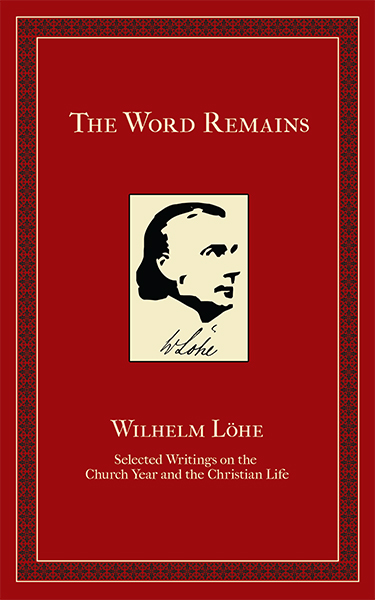 A review essay by Todd A. Peperkorn
A review essay by Todd A. Peperkorn
The Word Remains: Selected Writings on the Church Year and the Christian Life is a collection of sermons and writings by the renowned mission pastor and nineteenth century theologian, Wilhelm Löhe (1808-1872).
I first ran into this book while visiting Neuendettelsau in 2009. We were staying with friends in the area, and he happened to have a copy of this book in the German edition from 2008. Since that time it has been calling to me from my shelves, mocking me for not knowing German well enough to really appreciate the language and poetry which is Wilhelm Löhe.
But no longer.
It is available in English for the first time, thanks to the work of Emmanuel Press of Fort Wayne, Indiana.
In an introductory essay, Manfred Seitz gives us good counsel on how to receive and make use of this little book. He writes:
There are two kinds of reading: lingering reading and consuming reading. People of the ancient and medieval world, where there were no or very few books, read slowly— repeating, pondering, and lingering over what they read. Then, above all through the invention of the printing press by Johannes Gutenberg (1400–1468), came reading for the purpose of consumption, in which lines and sentences were quickly skimmed. This is the way we mostly read books, newspapers, journals, and documents. The former, the careful and contemplative reading, which satisfies itself in just a few pages per day, is what we ought to take up again, apply, and practice. This is how we get back to Wilhelm Löhe, and this is how his writings should be read.
In this little volume the reader will find that nearly every sentence drips with Gospel infused wisdom. I found myself wanting to highlight every page, until I realized that the whole book is worthy of that kind of careful attention.
The book is divided into three parts. The first part follows the rhythms of the Church Year, and offers insight into each season without going into much depth on the particular texts. The second part is what I would call the doctrinal section, and which Löhe calls “Our Faith”. The third and final part is entitled, “Brief Maxims from Löhe,” that is, short says or aphorisms on various topics both theological and non-theological.
Here is a good example of the encouragement offered to the believer by Löhe:
Faithfulness—in Little Things
It is a hidden glory in the Christian life to practice faithfulness in little things, that is, in one’s vocation; yet it is more difficult and more glorious than martyrdom. Martyrdom is aided by an agitated time, an emotional disposition, and it is often quickly won; it only takes a brief moment. But being faithful in little things involves bearing patiently the quiet tedium of a monotonous, elapsing life to the praise of the Lord (p. 81).
Now you could probably sit down and read this book in an hour and a half start to finish, and none the wiser. Add in the supplementary materials that introduce and follow the book, and they are almost worth the price alone. The work stands by itself as a hopeful view of the life that is to come even while the world is dying all around us. But reading it start to finish and then putting it away would be a mistake.
My best suggestion for this work is to buy and read it straight through, so you have a sense of the whole. But then sit back and let the words linger for a time. Take a couple pages a day and drink them in. Don’t be in a hurry. The words will be there and aren’t going anywhere. I would also suggest that The Word Remains is a welcome compendium to Löhe’s Seed-Grains of Prayer, also available from Emmanuel Press.
What really typifies the book for me are the words hope and joy. So often we tend to look down in our reading and meditation, or see “devotional reading” as a chore or something to get through. But Löhe manages to look up and look forward through the cross to the Last, Great Day. His writing is, in that way, deeply Christological and sacramental.
It is just what this pastor needs every day.
This book was provided to the reviewer at no charge by the publisher.

One thought on “The Word Remains, a Hopeful Book by an Old Lutheran”